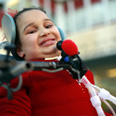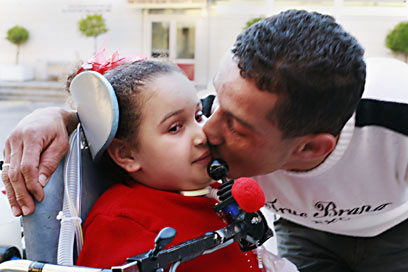
Six-year-old Maria Aman
צילום: יואב גלאי
Maria doesn't know she'll never walk
Maria Aman was seriously wounded in a targeted killing in Gaza some ten months ago. Since then she has been hospitalized in Israel, paralyzed from the neck down. Her father can't bear to tell her that her condition will never change. The Sunday Times says it has collected 10,000 pounds for Maria
The Sunday Times reported that it had collected almost 10,000 pounds in readers' donations for Maria Aman, a six-year-old Palestinian girl who was seriously wounded in a targeted killing in Gaza some ten months ago. Aman's mother, grandmother, brother and uncle were all killed in the attack while she was left paralyzed from the neck down and will have to be ventilated for the rest of her life.
After her injury Maria was transferred to the Tel Hashomer hospital in central Israel and from there to the Alin children's rehabilitation facilty in Jerusalem. Initially her father, Hamdi, was barred from visiting her as he did not have an entrance visa from Gaza but due to public pressure he was granted entry and since then hasn't left his daughter's side. He sleeps on a mattress beside her bed, clothes her, feeds her, combs her hair and takes her for walks.

"I haven't told her that her condition will never change yet. I'd rather she think it's only temporary so that she'll be happy and won't get depressed. Her brain is the only thing that works and the situation is very difficult for her," Hamdi told Ynet. "In the meantime she's learning with a computer, she goes swimming in a special pool in the hospital and she's taken good care of here."
After ten months of rehabilitation Maria is being allowed to leave the hospital and move in with her father, though she will have to remain close to the medical facility in Jerusalem since it's the only one in the country which specializes in cases like hers. In the meantime she remains in the hospital until the ministry of defense locates housing suitable for her needs and also purchases the expensive medical equipment she will need. The special wheelchair alone costs some $12,000 and her family continues to live off state stipends and donations. Maria and her father are not Israeli citizens and are in the country on visas.
For several long months Hamdi did not receive the compensation money from Israel and only media pressure eventually helped him. Hamdi was also given a room in the hospital motel.
Hamdi: We want an Arab environment
The ministry of defense has offered Hamdi a home in kibbutz Ramat Rachel near Jerusalem, close to the treatment center, but Hamdi says the offer is irrelevant.
"What will I do in a kibbutz," asks Hamdi, "from one prison they want to send us to another prison. Maria and I are Arabs, we need to live in an Arab environment. The best solution for us would be Beit Tzafafa, since it is both close to the hospital and the school I want to enroll Maria in. The problem is that the ministry of defense has yet to find us a home there."
Following the media exposure Hamdi and Maria garnered many citizens have come to the Alin hospital to offer aid. Some donate money, others bring food or clothes. "It warms my heart," says Hamdi, "I can't work when my girl is like this. I will never stop trying to help her condition. As soon as I can and have enough money, I will check with doctors abroad if there is anything that can be done."
Hamdi maintains a close relationship with his family in Gaza, including his three-year-old son who he left there. The family also sometimes comes to visit him and Maria. "I will never leave her. All my life I will buy things for her, cook for her and feed her," promises Hamdi.










